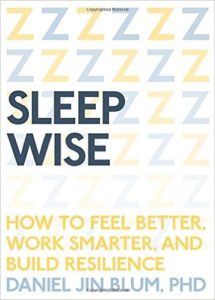BOOK REVIEW
By Katherine A. Carroll, NTP
Sleep Wise: How To Feel Better, Work Smarter, and Build Resilience
By Daniel Jin Blum, Ph.D. (ISBN-13:9781941529409; Parallax Press Publication; 2016; 352 pages; $16.95, CDN $22.95)
 “Sleep is overrated,” that’s what I thought until Margaret Thatcher, who slept 4 hours a night, got dementia. Her brain didn’t have the repair time needed to be cleansed “like an ocean tide” with cerebral spinal fluid washing away protein buildup such as beta amyloid. I respect the ocean. I now respect sleep just as much after finishing Dr. Daniel Blum’s Sleep Wise.
“Sleep is overrated,” that’s what I thought until Margaret Thatcher, who slept 4 hours a night, got dementia. Her brain didn’t have the repair time needed to be cleansed “like an ocean tide” with cerebral spinal fluid washing away protein buildup such as beta amyloid. I respect the ocean. I now respect sleep just as much after finishing Dr. Daniel Blum’s Sleep Wise.
Chronic sleep deprivation can manifest as difficulty with recall, feeling overwhelmed, exhaustion, low immunity, and emotional blowouts, and worse. Less than six hours’ sleep a night doubles the risk of stroke and heart attack. Most of us are not motivated to change unless we receive the compelling “why.” When Dr. Blum reveals multiple organs and systems deleteriously impacted by lack of sleep, it makes sense and motivates us to change.
Thanks to Sleep Wise’s empowering content, I now prioritize sleep, managing it instead of it managing me, and potentially destroying health and balance. It has been noted that people carrying the gene variant p.Tyr362His are able to function on fewer than five hours of sleep per night. But for the rest of us, sleep must be a priority and it is a skill that can be honed even if we are a victim to insomnia or broken sleep. We can all learn to manage sleep with skill by laying down neural pathways in the brain to support intentions.
Daniel Jin Blum, PhD., a clinical psychologist, is a sleep coach at the University of California at Berkeley with a private practice in Redwood City, California and is a Behavioral Sleep Medicine Fellow at Stanford. He helps people reach their peak performance by improving sleep health through cognitive behavioral and mindfulness-based techniques.
Dr. Blum adds questions after each chapter to help us manage our own sleep and master the material. The benchmark for all sleep specialists is the sleep log. While tedious , it proves quite simple and is worth keeping a log if only to raise awareness, revealing areas to manipulate in your own “sleep story.” Once we subtract time spent working in bed, reading or having “screen time,” waiting to fall asleep, waking and trying to get back to sleep again, and finally waking but not getting out of bed, the amount of sleep you’re getting may surprise you. Sleep Wise is a valuable book; the few dollars and hours invested can change your quality of life and health. Literally.
His own sleep story of a “great sleeper who can sleep through anything” proved deceptive. Due to sleep apnea in his 20s detected by his sleep-mate, his perceived “solid sleeping” punctuated with periods not breathing was starving his brain of oxygen producing dysfunctional sleep leading to disease states. Breaking the myth, he declares all snoring abnormal and suggests a few medically-related ways to correct it by moving into mindfulness meditations in other sections to address other problems, such as an overactive brain at bedtime. But the book goes far beyond sleep apnea and addresses every scenario most all of us are sadly familiar with – even those sleep problems besetting children.
From my nutritional therapy background, I had hoped that Dr. Blum would have included more than just a focus on natural melatonin production but also overall nutrition, natural (yet exogenous) brain neurotransmitter replacement therapies such as GABA (which inhibits an over-active brain), and other holistic modalities for poor sleep, teeth grinding, and sleep apnea to augment his interventions. Instead, he provides medical models and physical solutions such as sewing a tennis ball into the back of a sleep shirt for sleep apnea for instance. These suggested additions would create a comprehensive sleep manual; it is incomplete without them.
His organized, logical practicality addresses the separation of the bed from much of life except for sleep and sex. He associated jet lag from sleeping in with upset circadian rhythms, covers “sleep hygiene,” sleep environments, guided visualization, progressive muscle relaxation, our dangerous affinity for blue-light emitting screens of all kinds at day’s end, the bed being a catchall for worrying, emailing, working, watching stimulating TV shows, and texting in bed, quantity versus quality of sleep, and more.
After reading (with many highlights added) Dr. Blum’s book, I resolve to use my bed for a limited range of things and to put sleep as a priority whereas work and production was included as a priority before. This book was so good, I will go back and reread my highlighted portions aiming to truly own and implement this life-saving knowledge.
Admittedly, much of his teaching is breaking habit patterns and providing practical replacements; his behavioral degree makes this book a workbook. Realizing the brain’s malleability and that new mental skills can accumulate toward controlling sleep is empowering as health improvement is a constant goal for many of us.
After reading his book, Sleep Wise, I assure you Dr. Blum has a winning combination that gives hope through knowledge, understanding, and practical exercises. This well-organized and bio-individualized book will help you master sleep-health with a take-charge attitude developing skills that will result in vitality and health.

No Comments Yet